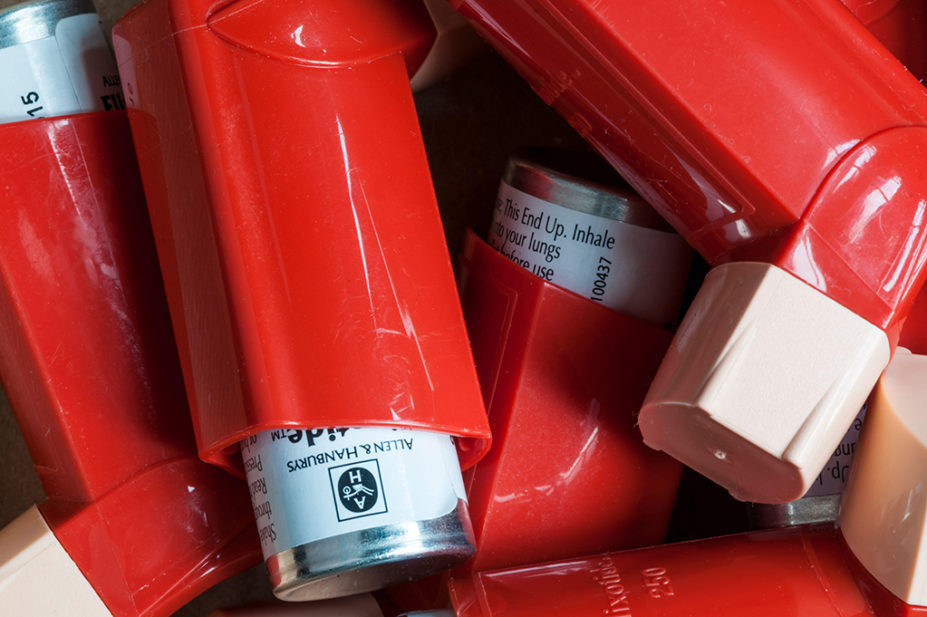
UrbanImages / Alamy Stock Photo
Patients in England are having their inhaler devices switched without appropriate consultation, potentially leading to worsening disease control, respiratory experts have told The Pharmaceutical Journal.
Their claims have come as primary care networks (PCNs) are due to start work on switching patients from metered-dose inhalers (MDIs) to dry powder inhalers (DPIs) and soft mist inhalers (SMIs), which do not require a propellant gas that could contribute to climate change.
In September 2021, a document published by NHS England — which detailed plans for PCNs for 2021/2022 and 2022/2023 — set out four targets to support improved respiratory care and health outcomes for people with asthma.
The targets were put in place to reduce avoidable carbon emissions by encouraging the choice of lower carbon inhaler alternatives, where clinically appropriate.
The document said that additional guidance would be provided “to support shared decision making and patient choice of inhaler”.
However, the targets were delayed until April 2022 to ease GP workload during the Omicron COVID-19 surge, but respiratory experts say that patients in some areas are already being switched en masse.
Toby Capstick, consultant pharmacist in respiratory medicine at Leeds Teaching Hospitals NHS Trust, said he had been contacted “by a number of pharmacists and GPs” expressing concern about non-consented inhaler switches.
“I’ve been contacted by a GP, saying their colleagues were blanket switching patients from an MDI to a DPI — same drug, or drugs, but in a different device — but they weren’t checking inhaler technique,” he added.
“She wanted advice as a number of the [patients] were getting worse … because it wasn’t being done with the patient it was causing worsening asthma control — the patients were noticing it and coming back to the practice.”
Capstick added that he had also been contacted by Community Pharmacy West Yorkshire following similar reports of blanket switching from a GP practice and PCN in the region.
“Patients had no idea about this until they were getting their prescription. Some had received a letter but hadn’t really read it and there was information on the practice website about it — but it wasn’t proactively contacting those patients, getting their agreement and checking their inhaler technique.”
He added that although he had only been contacted by “a handful” of people it was likely that this was “only touching the surface” of the problem.
Omar Usmani, professor of respiratory medicine and consultant physician at the National Heart and Lung Institute (NHLI) at Imperial College London, said he was also aware that some patients had their inhaler device switched without appropriate consultation and that this was “deeply worrying”.
“Indeed, in the climate of informed patient consent, patient empowerment and active patient engagement, this is clearly incorrect practice,” he added.
“There are inherent risks in switching patients’ inhalers without seeing them and not obtaining their consent, leading to discontent amongst patients, diminishing their confidence in their medication.
“[It could also] impact their perception of control of their lung disease, [an increase in] resource utilisation and waste medication … and quite importantly, worsening of their clinical condition and damage [to] their trust and relationship with their healthcare professional.”
Usmani added that it was “imperative” that prescribers do not undertake “blanket, process-driven switching”.
“Every patient with an inhaler, or any new patient, should have an inhaler check. We must train our patients in the correct use of their inhaler device and ensure a patient can use their inhaler device with confidence.”
NHS England was approached for comment, but declined, pointing to a previous comment from October 2021 saying the incentives for PCNs on inhalers were “the product of extensive clinical input and patient engagement”.
Read more: Greener inhalers: are we setting the wrong targets?
2 comments
You must be logged in to post a comment.



When the practices/individuals changing inhalers without consultation with the patient were approached for comment, what did they say?
Community pharmacists can support patients on correct inhaler technique when prescribed a new inhaler by providing a new medicines service.